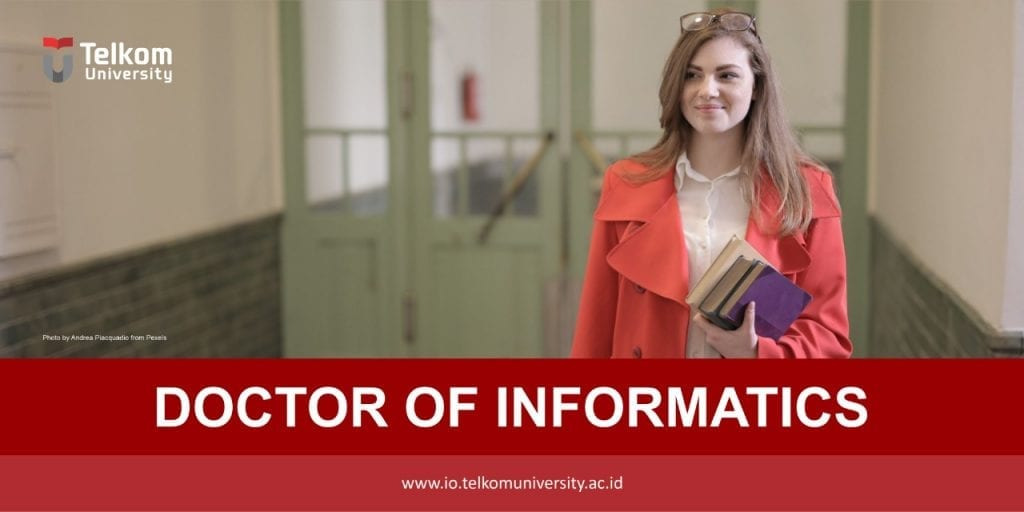
Course Name : Informatics Doctoral Program
Head of Department :
Address : Jl. Telekomunikasi, Terusan Buah Batu
Post Code : 40257
City : Bandung
Telephone Number : +62 27566456; +62 227564108; +62811 2001 105 (Hotline)
Facsimile Number : +62 227565200
Email Address : [email protected]
Website : https://docif.telkomuniversity.ac.id/
Informatics Doctoral degree has a research focus on two areas: Data Science and Cyber-physical Systems (CPS). Graduates will have the competence as a principal investigator in a large research programme who can develop their knowledge independently or join a team in a research institution, university, or industry, and have leadership and management skills. Informatics doctoral degree has a 3 years length of study with regular class schedules from Monday to Friday carried out onsite with a note that the schedule is adjusted by terms of the study programme.
[WPSM_AC id=12465]
INFORMATICS DOCTORAL PROGRAM LEARNING OUTCOMES
| Affective Domain | 1. Fear of God Almighty by: having moral, ethical (both general and academic) and personality who are responsible for completing tasks based on their expertise independently; respecting the diversity of religions, cultures, as well as the opinions and original findings of others; and having the spirit to put the interests of the nation, state and large society.
2. Able to demonstrate academic leadership in the management of research in the field of Informatics which is beneficial for science and the benefit of mankind. |
| Cognitive Domain | 1. Mastering theories and philosophies in the field of Informatics covering the fields of Data Science and CPS and applying them in a structured and systematic manner.
2. Being able to develop theoretical, philosophical and applied concepts in the field of Informatics that they are engaged in, as well as to represent them in a structured and systematic manner in accordance with the focus areas of Data Science and CPS research. |
| General Skills | 1. Able to find or develop new scientific theories or concepts or ideas in order to contribute to the development of science and or technology to produce scientific research based on scientific methodologies.
2. Able to compile research in interdisciplinary, multidisciplinary, or scientific trans-disciplinary, in the form of theoretical studies and or experiments. 3. Able to communicate effectively and efficiently using Indonesian and English properly and correctly and able to write and present scientific papers as outlined in the form of dissertations, and papers that have been published either nationally or internationally. |
| Specific Skills | 1. Able to formulate current issues and develop a research roadmap in the field of research he is involved in, with a focus on Data Science and CPS.
2. Able to formulate research problems, as well as formulate research gaps in order to produce original research and can make a real contribution to scientific development through systematic, critical, exploratory, innovative studies both independently and in groups in the scientific field, focused on the field of Data Science and CPS. |
INFORMATICS DOCTORAL PROGRAM CURRICULUM
| 1st Stage:
Qualification |
At this stage, students are required to take a number of compulsory courses and specialization courses, as well as a Qualification Examination. Qualification Exam is a test to determine the extent of student competence in mastering the fundamental course or any methods that can be used to support dissertation research.
Assessment components of qualification exam: 1. Mastery of basic materials related to the problem to be studied. 2. Review of previous related studies: understanding of the issues raised, methods used, analysis of results, and opportunities for further development. Qualification exam can be implemented if students have registered and completed all lectures in the 1st semester, and completed no later than 2 semesters since the student starts the Doctoral program. |
| 2nd Stage:
Research Proposal |
At this stage, students are not only required to prepare a research proposal, they are also required to take a compulsory subject of specialization to support the proposal preparation process. This stage is completed no later than 4 semesters since the student starts the Doctoral program. Students are declared to have passed this stage if they pass the proposal defense approved by from the supervisor and assessor team.
The assessment components of the Proposal Seminar are: 1. Problem definition, including justification and related literature 2. Research plan: methodology, research planning 3. Originality of the topic 4. Methodological accuracy 5. The novelty element of the research 6. Research output |
| 3rd Stage:
Research & Publication |
At this stage, students are required to conduct research and progress report regularly. Besides, students are also required to write and publish the results of their research.
There are 3 sub-stages in the Research & Publication stage: · Dissertation, Seminar 1 and Writing Scientific Publications 1 Pre-requisites: Qualification Exam and Research Proposal Seminar Passing Requirements: 1. Students can defend the method that will be used for solving research problems. 2. Students have been able to conduct initial experiments according to the proposed method 3. Students already have 1 draft of scientific writing to be published
Dissertation, Seminar 2 and Writing Scientific Publications 2 Pre-requisites: 1st Sub Stage (Dissertation, Seminar 1 and Writing Scientific Publications 1) Passing requirements: The student has been able to produce a scientific contribution published (status accepted) in a reputable international conference or national journal.
Dissertation, Seminar 3 and Writing Scientific Publications 3 Pre-requisites: 2nd Sub Stage (Dissertation, Seminar 2 and Writing Scientific Publications 2) Passing requirements: Students have completed a series of dissertation research which is stated with a scientific contribution that can be published in a reputable international journal (draft manuscript) and written in a dissertation book. The draft of the manuscript must be approved by the advisory team. |
| 4th Stage:
Dissertation Defense |
At this stage, students take dissertation defense and complete their dissertation writing. The prerequisite for this stage is that the student has passed 3rd stage: Research and Publication and already has a publication in a reputable international journal with accepted status. Evaluation of passing the dissertation examination stage is determined based on the assessment by the supervisor and examiner team in a closed session and an open promotion session. |
Informatics Doctoral Program Study Program
[WPSM_AC id=12449]
INFORMATICS DOCTORAL PROGRAM PROMOTOR
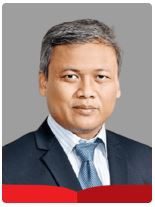 |
Name: Prof. Adiwijaya
Research Focus: Data Science Research fields: Data and information science, Combinatorial optimization Research: 1. World Class Research: Tsunami Reconstruction with a Machine Learning Approach for Disaster Mitigation and Prevention Profile Link : Scopus, Google Scholar, Sinta, ORCID
|
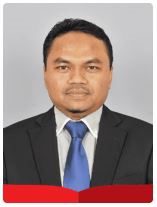 |
Name: Prof. Maman Abdurohman
Research Focus: Cyber Physical System Research field: Computer Network, Embedded System Research: 1. LPDP Research Project: Smart Lighting System to build a Green Ecosystem based on Internet of Things (IoT), case study: PT Bio Farma 2. PPTI Kemenristek BRIN: Implementation of Internet of Things (IoT) Based Vaccine Seed Storage Room Security Using the OpenMTC Platform Profile Link: Scopus, Google Scholar, Sinta, ORCID
|
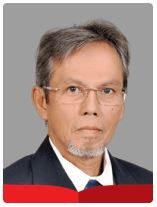 |
Name: Prof. Rendy Munadi
Research Focus: Cyber Physical System Research field: Internet of Things (IoT) with Machine Learning Tools Research: 1. PURWACARAKA-An integrated palm-based biometric security system based on IoT and Zeegbe Flatform 2. Analysis of the Feasibility of Using the ADHOC Wireless Mesh Sensor Network as an IoT-based Residential Environment Security System Infrastructure Profile Link: Scopus, Google Scholar, Sinta
|
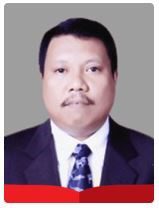 |
Name: Prof. Saparudin
Research Focus: Data Science Research fields: Image processing, Computer Vision, Pattern Recognition Research: 1. Image Retrieval with a Hybrid of Contour and Texture Features as The Basis for Object Image Content 2. Multi-Face Image Recognition System with Skin Color Segmentation Based on Content Image Retrieval (Cbir) and Agglomerative Clustering Profile Link: Google Scholar, Sinta
|
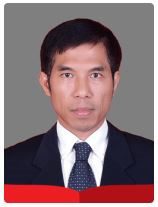 |
Name: Prof. Dr. Suyanto, S.T., M.Sc.
Research Focus: Intelligent system Research Field: Artificial Intelligence, Machine Learning, Data Mining, Speech Technology, Linguistics and Language, Swarm Intelligence, Evolutionary Algorithm, Soft Computing Research with self/internal funding: 1. Swarm Intelligence for Continuous Optimization Problems: function, science, and engineering optimization 2. Swarm Intelligence for Discrete Optimization Problems: vehicle routing problems, timetabling, etc. 3. Explainable Artificial Intelligence for Medical Applications: Diabetes, Glaucoma, Lung, Cancer, etc. 4. Explainable Deep Learning for Robust Computer Vision: object detection, classification, identification 5. Advancing Nearest Neighbor Classifiers: multi-commission representation-based classifier, etc. Research with external funding: 1. Phonemic Syllabification Model of Indonesian Words and Entities Names 2. More Accurate and Natural Indonesian Text-To-Speech Model 3. Detection of Multiclass Glaucoma Profile Link: Scopus, Google Scholar, Sinta, ORCID |
APPLICATION PROCEDURE
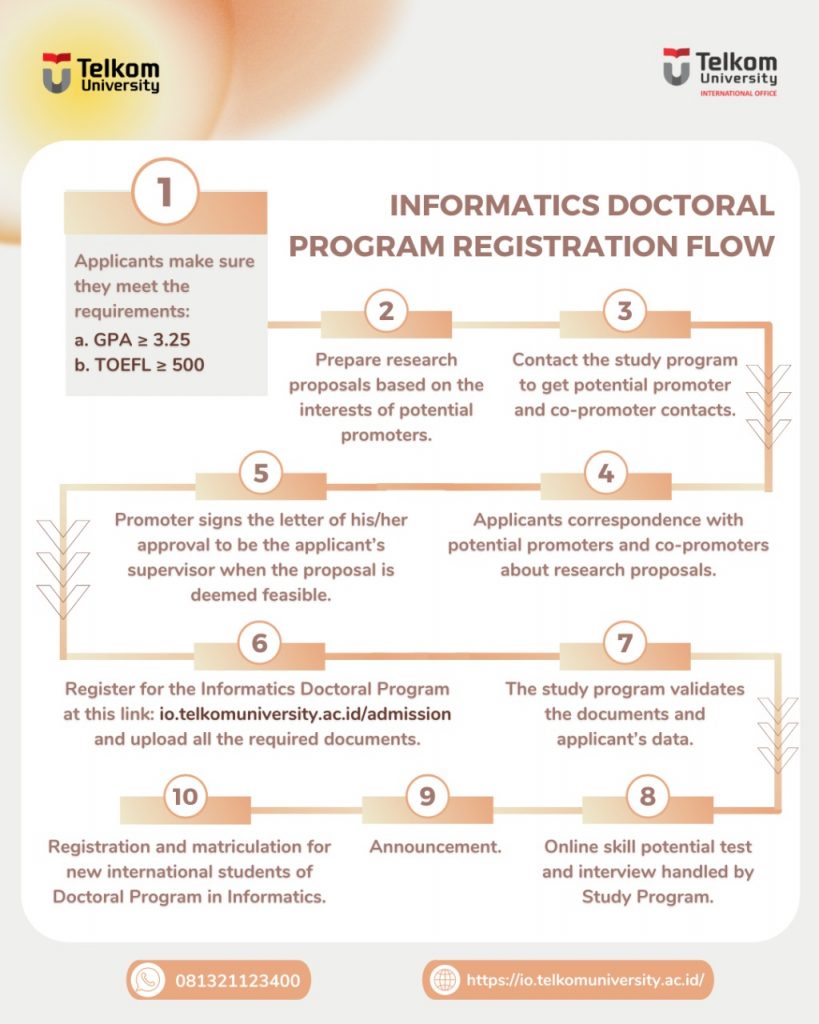
There are two steps of applying for Doctoral Degree program:
- Administration Step
Before applying to the online application, applicants must complete the Administration Step as follow:
- Applicants find promoter and get his approval letter. Applicants are required to request correspondence with the prospective promoters via email: [email protected]
- Applicants prepare required documents (Template of some documents can be downloaded at https://bit.ly/DoctoralInformaticsInfo):
- Approval Prospective Supervisor (promoter) Form (template 1)
- Employers Permission Letter Form (template 2)
- Residency Commitment Letter Form (template 3)
- Scan of Bachelor Degree Transcript & Certificate
- Scan of Master Degree Transcript & Certificate
- Recommendation Letter (Minimum 2)
- Research Plan
- Motivation Letter
- Scan of Passport
- English Proficiency Test (TOEFL/IELTS)
- Passport Formal Photo (Red-Background)
- Statement of Compliance to the Rules
- Application & Selection Step
Once all documents are complete, applicants apply to the Online Application Portal
- Go to io.telkomuniversity.ac.id/admission and create new account.
- Complete all application steps including Program Selection Step, Personal Data Step, Family Data Step, Educational Data Step, and Required Documents Submission Step.
- Wait for the schedule of Online Test (Potential Skill Test) and interview appointment announced by study program and International Office team.
- Conduct the Online Test and interview session as scheduled.
- Announcement.
(IO)***

